YouTube combating spam problem with switch to real names?
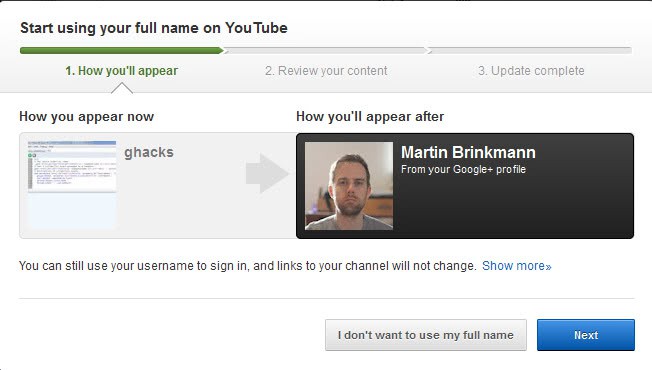
Reports have appeared on a number of websites that YouTube seems to display prompts to users of the site at the moment that is asking them to start using their full name on the site. When you try to leave a comment on YouTube you may see a popup or overlay window instead entitled "Start using your full name on YouTube".
The process is divided into three steps, with the first step highlighting how you will appear on YouTube if you accept YouTube's proposition to switch to your real name when commenting on the site. The popup also informs you that your channel urls won't change, and that you can still use your YouTube username to sign in just like before.
It displays how you appear right now on YouTube when you comment, and how you will appear after you have made the switch. At this point in time, you still have an option to skip the change by selecting I don't want to use my full name.
A click on next displays how content that you post on YouTube will be affected if you change the current username to your real name. It basically replaces the current username shown on the video pages with the new name.
A click on review my content here allows you to make some or all of your videos private when you make the switch to your real name. This is likely here to give you an option to hide videos that you have uploaded that you do not want your real name to be associated with. Say your latest Spring Break adventures, a night out with your buddies, or other videos that you may have had no problems with as long as your real name was not associated with them.
In the third and final step you get to review the changes one last time before they are finalized. You can still go back here if you want and skip the change at this point. It needs to be noted that all of your previous likes, subscriptions and favorites will be made private if you update your name on YouTube.
You may ask yourself why this is happening right now, and the most likely answer is that it is one of the ways that Google tries to fight comment spam on YouTube. It is likely that lots of the comment spam comes from the fact that users can't be identified if they use a nickname and not their real name, at least not easily.
Another reason may be to link YouTube more efficiently to Google's social networking service Google+ where the majority of users are using their real name.
Google's support page gives the following reasons for switching to your real name on the site:
- You want to keep one consistent identity across YouTube, Google, and the web. Your Google+ name and photo will appear on your existing YouTube channel.
- Your old YouTube username no longer represents you or your interests; you've outgrown it and want a new username.
- You'd like to use your full name on YouTube. Using your full name on YouTube will help your friends find you and your videos, and make it easier to share.
- You want to access new features that integrate Google products and services with YouTube. This includes improved sharing, live broadcasts through Hangouts On Air, and more to come.
If you read those reasons, you will notice that they only reflect the user perspective. Have you seen the real name popup yet on YouTube? If so, what is your take on the matter?
Advertisement
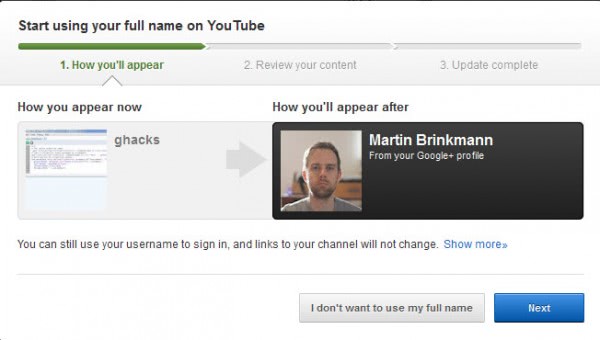
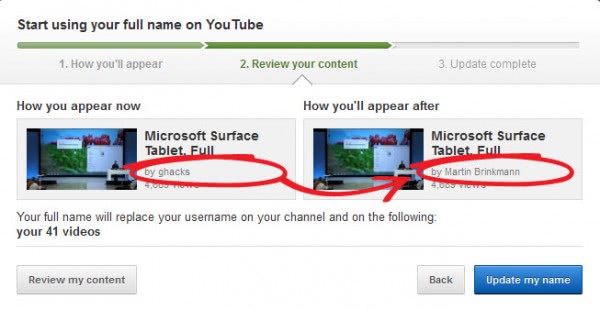





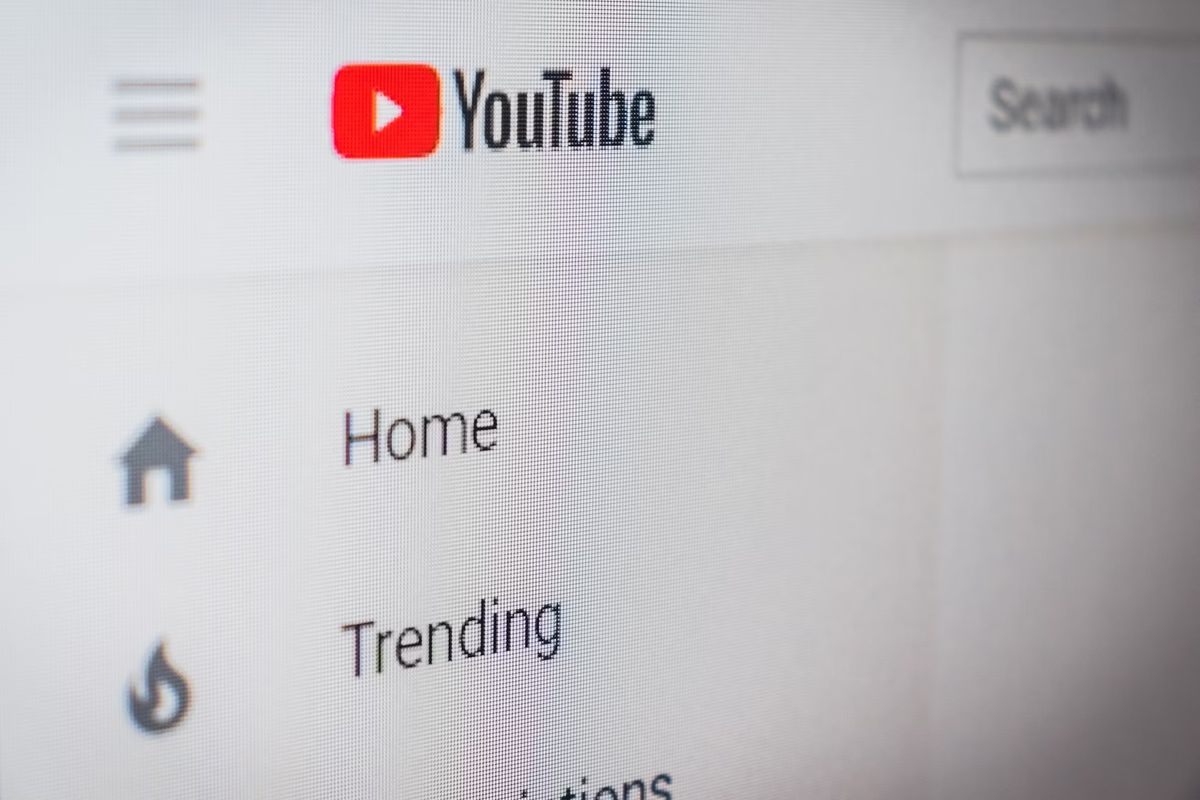

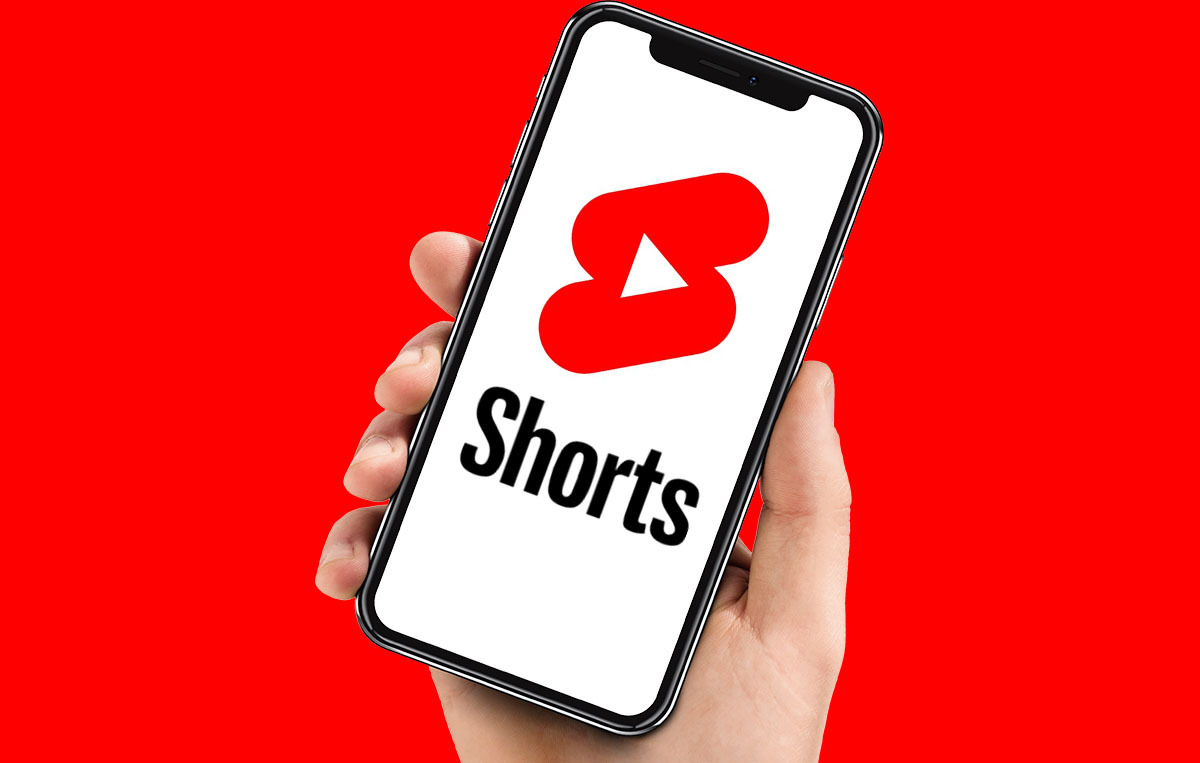











lol there needs to be a good firefox extension similar to those use to filter out spam on imageboards where you can filter out by keywords.
example I dont wanna read about rihannas so called sex tape on a nicki minaj video, etc
With that said, My google+ name isn’t real anyway and they probably wont take my shit away because of that because i been with them since 2004 when gmail launched.
Wow,I have a story to tell about it.
I got the option where I could change my nick on my youtube profile to my name which I did.
Then my photo changed into some other icon,which presented a bold guy in front of a painted picture of another guy playing a piano.I assumed it belonged to youtube. I was also given an option to change that icon and put any photo. I left the icon and continued using youtbue.
A few days after which is today I went to youtube. I thought ‘I better change that photo’ so other people won’t be thinking I am bold etc. I enlarged the icon and…I couldn’t believe.A bold guy was someone I know, a friend of another friend of mine. That photo was not in my computer,was never sent to me,I have never seen it.The bold guy is going to hospital tom. so I didn’t ask him about that photo yet,in fact he is not very cleaver with computers,I’m not sure if he ever used youtube. He lives a quiet life,he’s over 60 and doesn’t have any friends.My friend who knows him recognized the painting from the icon photo and told me it was taken in Las Vegas when Alex ( the bold guy) went to visit his family. We all live in London. I have Alex’s email somewhere among my email contacts but we hardly ever changed any email.
I now found out that the optional nick-name change actually happens on youtube but I can’t expalain the photo.Can anyone tell me what has happened?
IF anyone want to see the photo my name on youtube is Lukasz Wdowiak. I will have to change it at some point..
What if I switched to full name but want to go back to username?
Rachel, try this: http://support.google.com/youtube/bin/answer.py?hl=en&answer=2657858
Look… Google has their database tentacles wrapped around much more of our personal info than we can probably imagine anyway, whether they track us down by our nickname or real name. Personally, for me, I have a clean conscience on what video content and comments I post on YouTube. Changing my user name to my real name will actually help my career, because it will then match my web site name and other site names to help direct people to my music. When I was computer illiterate and naive, I used a nickname as my user name for YouTube. Bad for my name recognition in promoting myself! Ever since then, I’ve been waiting for them to give me this option.
Libels/lies by anonimous= is the official rationale behind North Korea , China policy on internet , which is propagated on West by some totalitarians wanting “Internet Drivers Licence” to curb, punish , and cut of WWW .(Kaspersky called 4 it)
Also they dream of approved content packets of internet like in cable TV.
History teaches that if you give any total gov.enforcement agenda such a power/possibilities -it’s plenipotency will grow on more and more areas with devastating effects- far exceeding what was in minds of “useful idiots ” at the beginning.
They in US even hired former chef of Stasi to help in plans of controlling ppl.
This is big brother, the government want to control us and Google want to ick their a???s.
Using a screen name is not any problem at all as long as Google have your identity linked to it, then if the Police, with a warrant, need the information they can get it.
They could allow users to protect their identity whilst still having an audit trail to the user to keep trolls in check.
As most probably know, the full release of the “worldwide web” part of the Internet didn’t really start happening until 1994 (though, obviously, the HTTP protocol existed for a few years before that as it was started, and then ramped-up during testing). As soon, thereafter, as 1995, then, I wrote a piece about Internet privacy which got published on what was then the magazine-like Time-Warner “PathFinder” website. It also got picked-up (with my permission, of course) by several other sites, and two print publications; and it eventually got used in several undergrad papers, and was cited in at least three masters thesis that I know of. I also got about a dozen requests from colleges and law schools to include it in currcula…
…to all of which I said “yes,” and for none of which I got paid. I say all that not to brag, but, rather, because it was just so cool to learn that my words ended-up in somebody’s published masters thesis, just for starters! I couldn’t believe it. Lil’ ol’ me. Who ever woulda’ thunk it. But now I’m digressing. Sorry.
The other reason I mention it is because I want to describe what’s happened since, and what I’ve learned from it.
The upshot of the piece was that there should be no anonymity on the Internet; that every person should be uniquely identifiable at least when it comes to things said person writes and posts online. I never suggested that people’s privacy should be violated by them being uniquely identifiable to search engines, or web sites just because they visited them, or to ad servers or anything like that. I never meant that. But I definitely believed, back then, that no one should be allowed to write and post anything (which, by logical extension, would include the now-possible (but then, not) posting of, for example, YouTube videos) anonymously.
And the reason, my piece argued, is that the danger of the kind of reputation-smearing libel and other general defamation that was possible on the Internet — and which could be exceedingly effective because of it — so far eclipsed any similar damage possible by pre-Internet techniques that a whole new way of thinking of things was called for.
On the Internet, I argued in the piece, anyone with ten bucks a month, a telephone line, and a computer with a modem in it, could get online and post anything and everything that s/he wanted, anonymously, about anyone, even if not true, with impunity. And because the Internet had such capability for such lies to be spread around the world in an instant, I argued that no one should be allowed to tell them anonymously (or under a pseudonym).
My rationale was that people would be more responsible if everything they did online was as their real selves; that they’d be as concerned about their responsibilities under the implied social contract — and behaving pursuant thereto — whenever they were online as they would be in person (ostensibly because they were the same people online as they were in real life; subject to the same social mores and other societal pressure to not act a fool in both places).
I predicted that unless anonymity were disallowed, people would defame one another mercilessly and prolifically; and that, as a result, horrible and awful things would be posted about a person that others might believe, and so said person might lose a job (or not be hired for one), or be ostracized or socially shunned, or not allowed to join a club or a church, or have his/her boyfriend/girlfriend — or worse, husband or wife — break-up with or leave him/her…
…and so on, and so on, and so on. I predicted that lives would be ruined; that suicides would be committed; that careers would end…
…every last one of which predictions has come true, in spades.
My own activism in life has caused things to be posted about me — horrible, despicable, wholly untrue things — online which have, even though they’re lies, cost me consulting clients (or caused prospective ones not to retain me), caused my wife’s family to wonder with whom she had mated, caused a church I wanted to join to hesitate, and even caused the church body which ultimately ordained me to wonder if they had made a mistake…
…all because anyone with a computer with a means of Internet connectivity, and the money to pay for it, pretend s/he’s anyone s/he wants, and say anything — and I mean ANYTHING, no matter how depraved — about anyone, with impunity.
In its worst forms, the ability to be anonymous has even helped people commit crimes… often — usually, in fact — also with impunty…
…exactly as I predicted, 17 years (at this writing) ago, when the worldwide web part of the Internet was but a baby, would happen. I was, I must say, downright prophetic.
I was also, the civil libertarian in me as since come to realize, wrong… at least about what should be done to prevent such defamation in the form of prohibiting anonymity.
I could not, in fact, have been MORE wrong. Were it not for the importannt lessons I’ve since learned from it, and how they’ve actually made my life better, I’d be ashamed, today, for my having even written that piece back in 1995. I wish, sometimes, that I could tell those who cited it in their masters thesis that I’ve since learned my lesson; that I didn’t mean it; that I want to take it back.
Had it not been for anonymity — in the form of political pamphleteering, and the posting of bills on trees and the sides of barns and other buildings back in the 18th century — this great nation of ours… this grand experiment in representative democracy… this beloved democratic republic and its very liberties for which we’ve fought and died…
…were it not for anonymity as this nation was in its hard-fought and won 18th century infancy and formation, we, today, would not be free. Simple as that.
Speaking out — speaking truth to power — has always had consequences… some of them dire; even, sometimes, mortal. It is obviously most desirable that those who opine and/or call for change so do under their own names, proudly wearing their words which, because they so do, are most likely to be well-considered and deeply-believed. Doing it that way has, no question about it, the most integrity.
And courage, too… because sometimes it got people injured or even killed. It often, in any case, got them ostracized, ridiculed, fired, even sometimes arrested. Again, consequences.
Nothing — not one single thing — in that regard, has changed in the ensuing nearly three centuries. Nothing.
Speaking out — speaking truth to power — still has consequences… and though one is less likely to be arrested, injured or killed (at least not institutionally; not, at least in the US) for them, said consequences are often still greater than even the courageous are willing to accept. Life is short. It’s hard to find a cause for which one is willing to have one’s life effectively ruined over it.
None of that has made any difference to me, of course. I’ve always said exactly what I believed, consequences be damned! And I’ve always, always done it under my own name. No pseudonyms. No aliases. No games. When I say or writ it, I so do as ME. Period.
And I’ve endured consequences, indeed, for it… some of them life changing… some even life’s oppotunities stopping. The price I’ve paid for my freedom of expression has been high, indeed.
But were it not for those before me who fought for that freedom having been able to so do anonymously, I’d not have been able to say it at all.
Indeed, the world, itself, absent the social conscience which is the United States and its unceasing demand of the rest of the world that it behave ethicallly and honorably, that it not violate the civil rights of its people, that it treat them with fairness and dignity…
…even, yes, even when we, ourselves, have not always so done…
…indeed, the world, itself, without all that, would be very, very, very different. Unlivable, in fact, I dare suggest. And all because those who created this great nation used anonymity to spread its glorious message.
I could not, then, have been more wrong in 1995… at least as to my suggestion that no one should be allowed to post anything anonymously (or using a pseudonym or alias) online. I simply could not have been more wrong.
And thankgod no one else thought so, else we might not actually have anonymity online, and so such as the Arab Spring, just to name one thing, might never have happened. Remember that smartphones and Facebook, and the communications capabilities they provided, played a huge role in the organizing for civil unrest which resulted in what started in Egypt and Libya, and which is now rolling across the Middle East like a storm of (at least potential) freedom. Between the Internet, and Al Jazeera, there might actually be half a chance that the world won’t come to an end because of unrest in that part of the world…
…that is, if we can stop Iran from blowing it all up anytime soon.
YouTube, it’s worthy of note, also played an immense role in the Arab Spring and all that has since emerged therefrom. The Occupy Movement, too. Without the articles and videos posted on Facebook, and the videos and comments posted on YouTube, neither the Arab Spring, nor the Occupy Movement, would have been as effective as they were. Thank goodness, then, for them.
How ironic it is, then — and also sad, I posit — that YouTube would be the very entity that now leads the charge of challenging those on the Internet’s rights to anonymity (or, perhaps more accurately, to psuedonymity). We can only speculate about Google’s reasons, but I can just about guarantee that they were not as pure as were mine, wrong-headed though I’ve since realized them to be, back in 1995. Google, I promise, has nothing in mind as its reasons for wanting everyone to use their real names which is as honorable as ensuring that no one’s life could be ruined through online defamation that’s capable of being spread around the globe at the speed of light through the Internet. Such were my reasons in 1995, but they’re almost certainly not Google’s now.
Google’s reasons, no doubt, are purely profit-motivated. By getting us to use our real names on YouTube, we begin the inevitable march down the awful road toward our ultimate loss of both anonymity and pseudonimity to ends which, because we then become uniquely identifiable to the likes of YouTube’s advertisers, only benefit Google and those who stand to make money from us and their knowledge of our online actions. It is the very definition — the poster child — of the very intentional opposite of what privacy policies were all about in the first place. It is, in fact, the beginning of the end of privacy. Period.
I wasn’t thinking about any of that back in 1995 when I wrote that piece. But I’ve figured it out since; and so I’ve always been comforted by that there are both privacy policies, and also anonymity. Indeed, I’ve paid a high price in life, in terms of how I’ve been defamed and its consequences, for my right to freely both speak and write. The price we pay for our liberties has always — and rightly — been high. But I now realize that we must — all of us — insist on having it no other way, no matter the potential defamation consequences for us.
Of course I’d love to know the true identities of those who’ve either anonymously (or by pseudonym or alias) defamed me; and if I bothered to sue them, of course I could find out who they are, and hold them accountable, through the magic and magnificant power of the almighty subpeona (a potent tool THAT can be in the hands of someone like me who knows how to use it). But at what cost. At what point does it just become not worth it, especially considering that I’ve long since figured out excellent ways to set the record straight about myself with those who’ve stumbled-onto bad things written about me online, and who either question me about them or, somewhat less courageously, hold me accountable by depriving me of some of life’s opportunties.
If we expect to hold-on to our precious liberties, then we must exercise them. We must use them to both effect change, and to also stop the corporate creep of liberty-depriving actions such as Google’s prodding us to use our real names.
I use my real name, always, because I want it that way. I want to wear everything I write and do online, with no question or ambiguity about that it was me who wrote or did it, and that I bygod meant it. That’s my choice. However, to write and do things online (or to say them in YouTube vidoes) under a pseudonym — effectively, then, anonymously — is an equally valid and also honorable choice… even if what is said or written is defamatory. Remember that censorship is not defamation’s legal remedy. Rather, pursuing a civil action in a court of law is the appropriate response. So even though I, more than anyone, know the pain of having been anonymously defamed, I cannot and will not demand that my defamers are no longer allowed to be anonymous online while they do it. The right to pamphleteer and post bills, anonymously, is as important today as it was almost three centuries ago.
But we must USE such rights…
…in this case, to stop the likes of Google from stripping us of our anonymity, if we choose to use it. And here’s the thing, and this is important: With the US Supreme Court having ruled that even corporations are people for free speech purposes (pursuant to 2010’s Citizens United v. Federal Election Commission, 558 U.S. 50), it’s going to become a question of how many Americans will stand-up to however many dollars corporate America can muster to fight us. If we do not, every last one of us, stand-up and be counted by exercising our rights to speak and act online, even anonymously, then we will lose those rights.
And the likes of Google will win.
Please don’t make me, 17 years from now, prophetic about that, too.
______________________________
Gregg L. DesElms
Napa, California USA
gregg at greggdeselms dot com
Yes, but what about, say, stating opinions based on real facts about, for example, Islam. It wouldn’t matter if what you say is based on true facts or not. Radical Muslim Extremists will now have your full name and could hunt you down. This idea is entirely stupid.
Whew Gregg, hell of a mea culpa! But really, your rant was overly verbose, defensive and a mite too self-congratulatory. Anyway, I know you could have reduced this to two or three paragraphs of essential content with just a little work.
Coincidentally, I came across this article in the NY Times today which may be of assistance in the future:
———–
July 26, 2012
How to Write
By COLSON WHITEHEAD
The art of writing can be reduced to a few simple rules. I share them with you now.
http://www.nytimes.com/2012/07/29/books/review/colson-whiteheads-rules-for-writing.html
————
I specifically call your attention to “Rule No. 4: Never use three words when one will do.”
G+ integration , also blue Facebook on more and more sites + login with Fb / Gmail ……
After you see your photo+ real name from G+ , next maybe from Gmail, or Facebook you’ll be more cautious in giving not politically correct opinions out in internet , then in your browsing habits …
Be obedient consument of main stream mass-debilitating-media not grass-root level independent “conspiracy theorists”-
– or else…= in e-databases will grow “evidences” of you as a potential t….r..t
That is it really all about .
After first signs of unwillingness most users join the flock ,
’cause life must go on – so changes must be good ,guided by…
Sheeple will be gradually accustomed to approaching NWO…
Lol…I wonder how many people named Your Fullname will start turning up on Youtube.
You can revert to the nick name (yet) if you want from this link
http://www.youtube.com/account_username?action_username=true
Interesting, thanks for letting us know.
The extract below shows some potential repercussions of people knowing your real name (and perhaps address). There are many reasons to keep an anonymous and/or low profile in today’s crazy world, especially if you have a family…
——-
Mann directs Penn State University’s Earth System Science Center. Several months ago, he arrived at his office with an armload of mail. Sitting at his desk, he tore open a hand-addressed envelope and began to pull out a letter. He watched as a small mass of white powder cascaded out of the folds and onto his fingers. Mann jerked backward, letting the letter drop and holding his breath as a tiny plume of particles wafted up, sparkling in the sunlight. He rose quickly and left the office, pulling the door shut behind him. “I went down to the restroom and washed my hands,” he says. “Then I called the police.”
For someone describing an anthrax scare, Mann is surprisingly nonchalant. “I guess,” he says, “it’s so much a part of my life that I don’t even realize how weird it is.”
“Weird” is perhaps the mildest way to describe the growing number of threats and acts of intimidation that climate scientists face. A climate modeler at Lawrence Livermore National Laboratory answered a late-night knock to find a dead rat on his doorstep and a yellow Hummer speeding away. An MIT hurricane researcher found his inbox flooded daily for two weeks last January with hate mail and threats directed at him and his wife. And in Australia last year, officials relocated several climatologists to a secure facility after climate-change skeptics unleashed a barrage of vandalism, noose brandishing and threats of sexual attacks on the scientists’ children.
——–
http://www.popsci.com/science/article/2012-06/battle-over-climate-change?single-page-view=true
so… how are they going to verify it’s your real name in the first place?
They are not unless you are using a service that requires your real name, e.g. Adsense or Adwords.
soooo it’s basically worthless.
I guess there will be users who use fake names and continue to comment like they did before. A chunk on the other hand will surely change their nick to their real name, so, you probably reduce the issue but not eliminate it.
None of google’s reasons for using your full name seem even tokenly plausible to me. 1 and 2 could easily be dealt with by changing your username to something that isn’t outrageously personally identifiable information, 3 seems completely daft (especially if your name is John Smith), and 4 seems utterly irrelevant. I’m glad the option is there, for now, to not use your real name, but I see zero benefit in doing so anyway.
I don’t want to use my full name, thats the option i choose. but nothing appeared here yet.
You’d like to use your full name on YouTube. Using your full name on YouTube will help your friends find you and your videos, and make it easier to share.
———-
Also help the government, your employer and many others know what you like, don’t like and what kind of perversities exist in your ID. :)
It is in some way end of privacy – pushing users to use real name and second name instead of nicknames; i would call this trend web 3.0 – where privacy doesnt exist anymore.